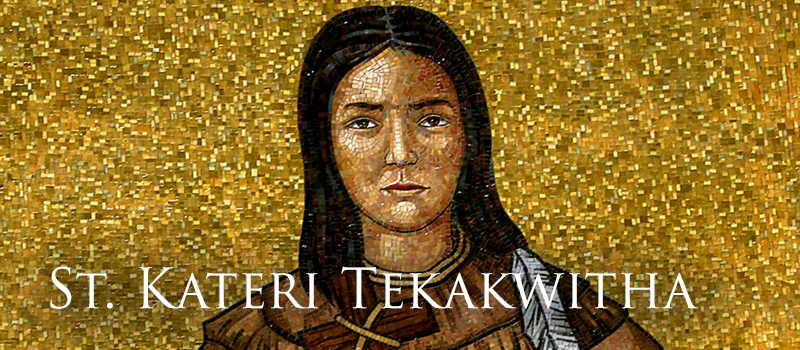St. Kateri Tekakwitha – a model for our times
by Fr. Henry Sands, Associate State Chaplain
Saint Kateri Tekakwitha made a heroic decision to respond to God’s call to live a devout Christian life through her trials and deep suffering—epidemic disease, tensions and fighting among warring Indian tribes, and the severe persecution of her faith.
Even though she lost her family, her eyesight, her physical beauty, her good health, and her village, she used all of these extremely difficult personal circumstances to cultivate a life of deep prayer and sanctity.
She is a model for our own times in that she shows us how, with faith in Christ, we can persevere no matter what personal calamities, social unrest, or religious persecution may come to us. St. Kateri overcame every obstacle by submitting herself entirely to Jesus Christ. She is also a model for young people who are striving to live a holy and chaste life, especially without the guidance of parents.
Pope St. John Paul II, at her beatification, called St. Kateri God’s “bountiful gift” to His Church and a “sweet, frail yet strong figure of a young woman.” It is said that St. Kateri’s last words were, “Jesos Konoronkwa,” which translates, “Jesus, I love you.”
At her canonization Mass, Pope Benedict XVI remarked on the miracle of grace in her life, how she rose to such a height of sanctity despite the circumstances of her upbringing, which would otherwise have been detrimental to the fostering of a Christian vocation.
“Kateri impresses us by the action of grace in her life in spite of the absence of external help and by the courage of her vocation, so unusual in her culture. In her, faith and culture enrich each other! May her example help us to live where we are, loving Jesus without denying who we are, Saint Kateri, Protectress of Canada and the first Native American saint, we entrust to you the renewal of the faith in the First Nations and in all of North America! May God bless the First Nations!”
St. Kateri is the patron saint of the ecology and the environment, orphans, Native Americans, and people ridiculed for their piety.
This article has been updated and was originally published in January 2013. © The Catholic Company


